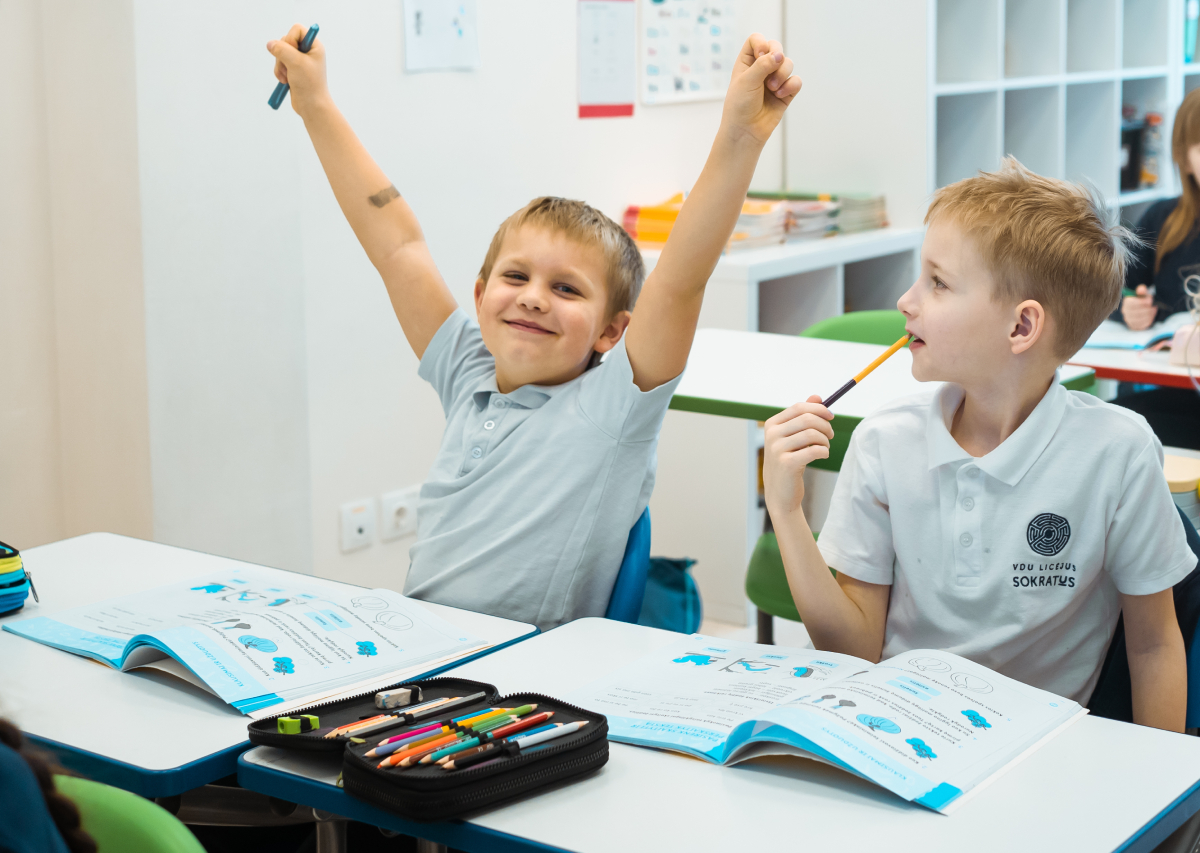Pradinis ugdymas (1–4 kl.)
Pradinio ugdymo pakopa apima mokymą(si) 1–4 klasėse. Į pirmą klasę priimami vaikai, kuriems tais kalendoriniais metais sueina 7 m., tačiau gali būti priimti ir jaunesni – 6 m. vaikai, įvykdę priešmokyklinio ugdymo programą. Pradiniame ugdyme mokymas grindžiamas darniu visų ugdymo sričių (dorinis, kalbinis, matematinis, gamtamokslinis, socialinis, meninis, technologinis, kūno kultūros, sveikatos) įtraukimu. Ugdymas organizuojamas atsižvelgiant į besimokančiojo individualius gebėjimus, užtikrinant kokybišką besimokančiojo dalyvavimą bendrose mokymosi veiklose, mokymąsi grupėje (lavinant socialines ir komunikacines kompetencijas). Ugdymas grindžiamas visapusiško integruoto dvikalbio (lietuvių ir anglų) mokymo(si) strategija.

UGDYMO GAIRĖS
- Nuoseklus ugdymas, apimantis skirtingų ugdymo pakopų integraciją nuo ikimokyklinio iki vidurinio ugdymo;
- Kompleksinė pagalba, iškilus mokymosi problemoms (logopedo, psichologo konsultacijos, ugdymo specialistų pagalba);
- Bendradarbiavimas su Vytauto Didžiojo universiteto akademine bendruomene;
- Anglų kalbos pagal Cambridge programą, ispanų kalbos, dailės, muzikos, šokių, teatro pamokas bendradarbiaudami su pradinio ugdymo mokytojais organizuoja ir vykdo mokytojai dalykininkai.
- Pradinis ugdymas grindžiamas kontekstualumo ir integralumo principais;
- Mokykloje prioritetas teikiamas aktyviems mokymo metodams, projektinėms veikloms ir pan.;
- Ankstyvasis užsienio kalbų mokymas (nuo 1 kl. – anglų kalbos pamokos pagal Cambridge programą, nuo 2 kl. – ispanų kalbos pamokos);
APLINKA
- Kuriama tolerantiška, emociškai ir fiziškai saugi aplinka;
- Pamokos mokiniams organizuojamos pagrindinėje klasėje, kurioje įrengtos darbo ir poilsio zonos;
- Tyrinėjimų, šokio, kūno kultūros, teatro, dailės ir technologijų pamokos organizuojamos atskirose, šiems užsiėmimams pritaikytose patalpose;
- Kiekvieną dieną vaikai laiką leidžia lauke (vyksta lauko pertrauka);
- Mokyklos viduje įrengtos poilsio zonos (skaitymo, interaktyvių žaidimų, stalo tenisas ir pan.);
- Klasės aprūpintos kompiuteriais, interaktyviais ekranais, ugdymo procese naudojami planšetiniai kompiuteriai, interaktyvios grindys ir kitos įvairios kompiuterinės mokymosi priemonės;
- Maitinimas organizuojamas mokyklos valgykloje.
Pirmokų tvarkaraštis
| Laikas | Veikla |
|---|---|
| 8:30-9:05 val. | Ryto ratas, pamoka |
| 9:05-9:20 val. | Pusryčiai |
| 9:20–9:30 val. | Pertrauka |
| 9:30–11:55 val. | Pamokos |
| 11:55–12:15 val. | Pietūs |
| 12:15–12:45 val. | Lauko pertrauka |
| 12:45–14:25 val. | Pamokos, pertraukos |
| 14:25–14:50 val. | Pamokos, pamokų ruoša |
| 14:50-15:05 val. | Pavakariai |
| 15:05–18:30 val. | Pamokų pabaiga, popamokinė grupė, būreliai |
2–4 klasių mokinių tvarkaraštis
| Laikas | Veikla |
|---|---|
| 8:30 val. | Pamokų pradžia |
| 9:15 val. | Pusryčiai |
| 9:30–12:05 val. | Pamokos, pertraukos |
| 12:05–12:45 val. | Pietūs, laikas lauke |
| 12:55–15:20 val. | Pamokos, pamokų ruoša |
| 15:20 val. | Pavakariai |
| 15:35–16:00 val. | Konsultacijų laikas |
| 16:00–18:30 val. | Pamokos, pamokų ruoša |
| 15:25 val. | Pavakariai |
| 16:00–18:30 val. | Popamokinė grupė, būreliai |
KAINA
| Pavadinimas | Kaina |
|---|---|
| Mėnesio mokestis (mokama 10 mėn.) | 680 Eur/mėn. |
| Maitinimo kaina | 10.20 Eur/d. |
| Mokslo metų mokestis | 480 Eur/m. |
Į mėnesio mokestį (rugsėjis–birželis) įskaičiuota:
- Kasdienis ugdymas pagal pagrindinio ugdymo programą 7:45–16.00 val.;
- Psichologo konsultacijos;
- Mokytojų konsultacijos;
- Dalyvavimas tarptautiniuose projektuose;
- Papildomi ugdymo programos moduliai.
- Aprūpinimas vadovėliais, pratybomis, bendromis mokymosi priemonėmis;
- Priemonės dailės, tyrinėjimų ir kt. pamokoms;
- Išlaidos higienos ir ūkio priemonėms;
- Licėjaus nuotolinio mokymo(si) platforma „GOOGLE for Education“;
- Dalyvavimas pirminiuose mokinių olimpiadų etapuose;
- Edukacinės išvykos Vilniaus mieste (renginių bilietų, edukacinių programų išlaidos)*;
- Programinės įrangos ir kitos licencijos;
- Bendruomeniniai renginiai licėjuje;
- Draudimas nuo nelaimingų įvykių.
*per metus į metinio mokesčio kainą įskaičiuotos dvi išvykos (be transporto išlaidų).
- Maitinimas: pusryčiai – 1,40 Eur, pietūs – 6,30 Eur, pavakariai – 2 Eur;
- Jei užsakomas specialus maistas alergiškiems vaikams, taikomas papildomas antkainis;
- Popamokinė priežiūra (16:00–18:30 val.) – 85 Eur/mėn. arba 6 Eur/d.;
- Licėjaus uniformos kaina;
- Papildomų užsiėmimų (plaukimas, šachmatai, robotika, kovų menai, keramika ir pan.) kaina.
